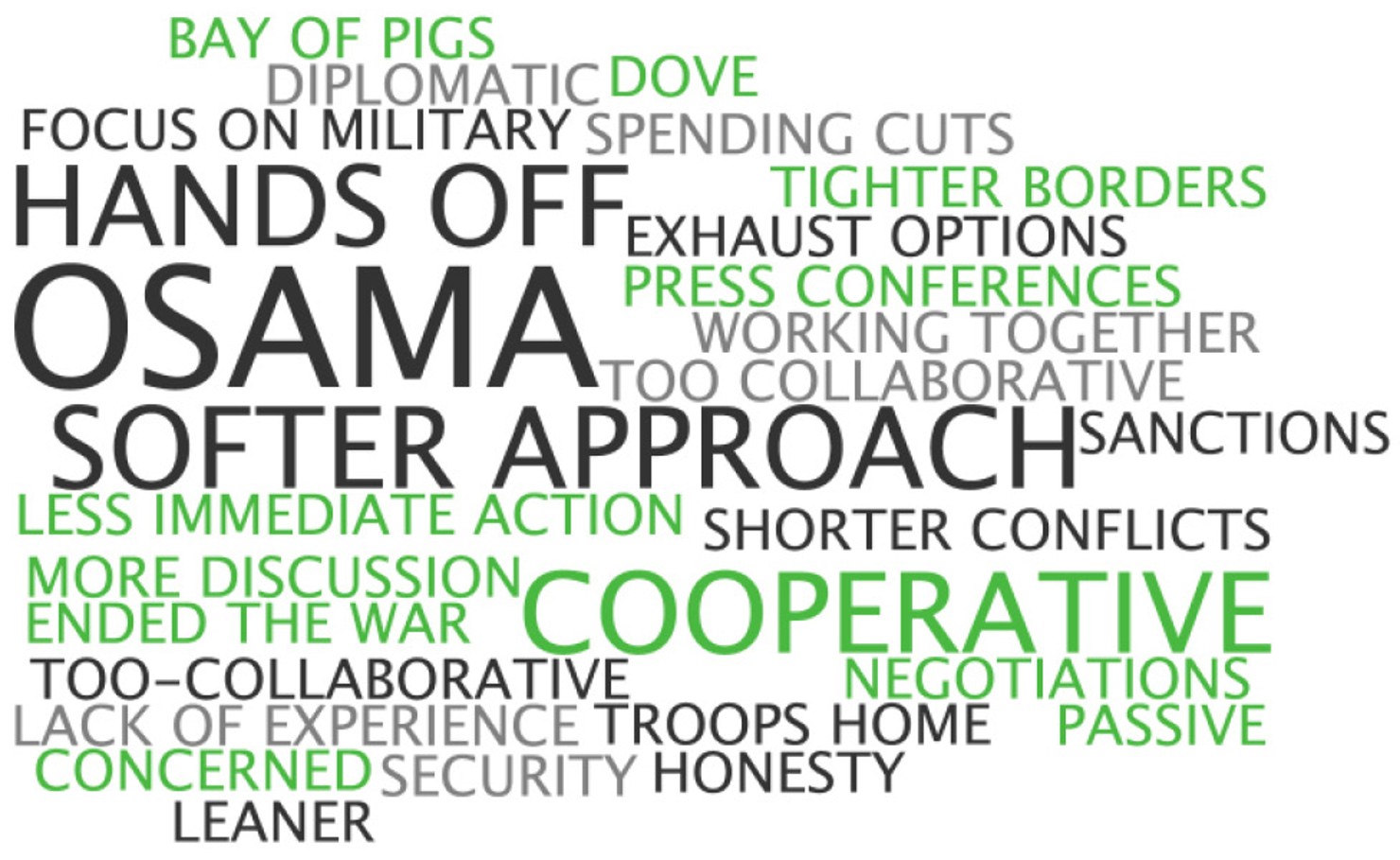Report Published March 1, 2012 · Updated March 1, 2012 · 19 minute read
Third Way and GQR's National Security Focus Group Report
Matt Bennett, Mieke Eoyang, Michelle Diggles, Ph.D., Jeremy Rosner, Kristi Lowe, & Amanda Oefelein
November’s presidential election will feature something not seen in American politics in more than forty years: a Democratic candidate who enjoys some of his strongest ratings on national security. Swing voters in a new set of focus groups1 are generally impressed with the job President Obama is doing in keeping the country safe. Yet his success has not erased old doubts or stereotypes about his party on these issues.
Obama’s strong image comes in large part from the success of the May 2011 raid on Osama bin Laden, along with a string of other security-related accomplishments. The Democratic Party, by contrast, continues to carry image liabilities on national security that stretch back a half century: indecisive, too hesitant to use force, and tending to heed public opinion over national interests. As a result, while our focus groups tilt toward Obama over his GOP rivals on security issues, they continue to trust Republicans somewhat more as a party.
But while there is a gap between Obama and his party on national security, there is a mirror gap for Republicans. The record of President George W. Bush has dented their strong brand on national security and leaves real doubts about what Republicans would do if they once again controlled the White House. These voters respond coolly to the national security messages of the 2012 Republican candidates.
Below are the main findings from the Third Way-Greenberg Quinlan Rosner research on these swing voters’ view of Democrats and Republicans on national security, followed by recommendations for translating the president’s success to the broader Democratic brand.
The Democrats
Obama’s Brand is Strong. The Party’s Brand, Not So Much.
Obama’s Solid National Security Record Makes an Impression
The headline finding—supported by public polling—is how strongly voters assess President Obama’s performance on national security. The swing voters in these groups say that the president is doing “pretty well,” “decent,” and generally better than they expected. An Ohio man describes Obama’s national security performance as “a pleasant surprise: he has continued to protect the U.S.; he hasn’t wavered and he’s shown that he is not afraid to use military force, which, when he came into office, I didn’t think he was going to do.”
Obama’s ratings on national security were already healthy before last May—three Third Way/GQR polls on national security in 2010 showed it to be a real strength for the president.2 But now, the bin Laden raid provides the main lens through which voters see Obama on these issues. As a Florida woman reflects: “That defines [Obama’s] future—that was the biggest hunt for a terrorist that there ever was—and they got him.”
Bin Laden’s death carries subtle layers of meaning for these swing votes: a reduced terror threat; confidence in U.S. Special Operations; evidence that Obama can work across party lines; and proof that he can ultimately “pull the trigger.” We show participants seven photographs of Obama in national security settings, and the iconic shot in the Situation Room watching the bin Laden raid makes these swing voters feel most positive about Obama. As a Tampa man explains, “It shows [Obama] can make a tough decision.”
Participants mostly agree that the U.S. is in a stronger position in the world today than four years ago, and most feel personally as safe or safer today. But the death of bin Laden does not define the end of an era for these voters, and they remain concerned about terrorism. They talk about the importance of continuing airport security measures. They believe the president has done a good job of consulting with his advisors and looking at the facts to make the right policy calls, from Afghanistan to Guantanamo Bay. The president also gets credit for striking the right balance between diplomacy and force.
There are a few cautionary notes for the president. Some participants give all the credit for the bin Laden raid to the Navy SEALs and broader U.S. military. Others say Obama is simply capitalizing on the security capabilities built up by George W. Bush and other Republicans before him. These are minority views, but there is a risk of going too far in taking credit and sounding boastful.
The Democratic Security Image Still Stuck in the Past
Obama’s solid standing on national security, however, has not yet rubbed off much on the image of the Democratic Party. These swing voters see Democrats in much different terms than the president—and trust them less on national security than the Republicans.
What we hear in these groups is remarkably close to what we found in a 2008 set of focus groups on these issues: Democrats too often are weak, indecisive, afraid to use force; lack grounding in military matters; rely excessively on diplomatic solutions; respond too quickly to public pressure; and defer too readily to the party’s liberal base. As one man from Cincinnati says of Democrats: “They are too willing to come to the bargaining table and ‘50/50’ it, and what’s the advantage to our country?”
While the swing voters in this year’s focus groups trust Democrats more on issues like diplomacy and boosting America’s global image, they trust Republicans more on “hard security” topics like “the effective use of military force,” “preventing terrorist attacks here in the U.S.,” “capturing, interrogating, trying, and imprisoning terrorists,” “intelligence and spying,” and “dealing with dangerous nuclear regimes like North Korea, Iran, and Pakistan.”
Their comments show that the roots of this image problem are decades old. “There have been a couple of Democratic administrations that screwed up military-wise,” reflects an Ohio man. “Jimmy Carter tried to rescue some people and then the other guy, Clinton, he threw some bombs down somewhere and that didn’t go too well either.”
Early Signs of a Potential Shift in Perception about Democrats
While the long-standing images of the two parties appear mostly steady, relative to our earlier research, these focus groups provide an early window on potential signs that Obama’s presidency may be slowly starting to change some of the stubborn negative perceptions about Democrats. As one Tampa woman says of the bin Laden raid: “I’d never heard of any Democrats doing something that dramatic, forceful.” And as the word cloud below shows, although these swing voters continue to harbor doubts about Democrats, the dominant association with the party on national security is now “Osama.”
Key Words Associated with the Democratic Party on National Security3

Obama’s strong record also may explain the absence in these groups of some negatives we heard in the past about Democrats. There is virtually no complaint, as in 2008, that Democrats insufficiently support the military, which may reflect Obama’s successful stewardship of the military, as well as the efforts he and the First Lady have made to support military families and veterans. It is also notable that, at a time when Obama has ended the U.S. troop presence in Iraq and begun planning for a drawdown in Afghanistan, not a single participant this year voices the old complaint about Democrats “cutting and running.” Republican attacks on this score appear to have little resonance with swing voters.
The Republicans
A Strong Party Brand, But Real Gaps Emerging
GOP Still the “Tough” Party of Reagan…
As the word cloud below suggests, these swing voters tend to see Republicans in stronger terms on national security—again, drawing on a long stream of historical memories. One Ohio man says: “Historically, [Republicans] have always reacted more appropriately and more quickly.”
Key Words Associated with the Republican Party on National Security

...But Possibly Becoming the “Reckless” Party of Bush
But while Republicans’ national security brand mostly remains strong, they may be starting to face some gaps of their own. First, there is a gap between the image of Republicans on national security and impressions of the most recent GOP president—particularly his performance in the Iraq War. Largely as a result of George W. Bush’s tenure, Republicans strike many of these swing voters as too extreme; too aggressive; too quick to take dangerous actions without all the facts; and “too quick on the trigger.” As one woman in Cincinnati says, “They want to go fight and then maybe ask the questions.”
To be sure, just as Obama has not yet erased long-term negative impressions about the Democrats, neither did Bush wipe out the GOP’s long-term perceptions of strength on national security. But these groups suggest the performance of both presidents may be helping to make the scales on these issues more balanced.
Republicans also appear to face the prospect of a gap when it comes to their potential standard-bearers in the 2012 presidential race. Despite the party’s reputation for strength, decisiveness, and a strong military, a number of swing voters are unsure about Mitt Romney’s credentials as commander in chief. “He would let everybody else make his decisions for him,” says one man in Cincinnati. “I just think he would run and hide,” says another. Newt Gingrich also raises concerns on security, with some of these swing voters worrying he would be “arrogant” and “uncompromising.” (We did not explore perceptions of Rick Santorum, since at the time of these groups he was not a real factor in the GOP field.)
Most worrisome for Republicans, their main messages on national security are not resonating with these swing voters. Among a set of messages from the Republican candidates we test, the only one that strongly registers is Ron Paul’s call to reduce America’s presence and spending abroad. Several participants say that although they consider Paul “kooky,” they respond positively to his argument that the U.S. is overextended.
By contrast, national security messages pulled straight from Romney’s speeches mostly fall flat. A Romney promise to retain “military superiority” and criticizing Obama for debilitating defense cuts gets positive responses from only about a third of the participants. A call for restoring American strength and leadership, including an attack on Obama for apologizing for America abroad, generates positive reactions from fewer than a quarter of these voters. An attack on Obama’s “reset” policy with Russia generates positive responses from fewer than one in twelve of the participants, who have difficulty thinking of Russia as a threat.
Obama’s Narrative and Record Trump the Republican Alternative
At the start of these focus groups, participants say they trust Republicans over Democrats on matters of national security by a slim 14-11 margin (5 others say neither or both or are undecided). But after hearing a balanced set of national security messages from both Obama and the Republican presidential candidates, a strong 21-7 majority (2 others say neither or both or are undecided) concludes that Obama and the Democrats have the better argument on national security. (This is too few voters for the results to have statistical validity, but it is still a big and notable shift.)
One reason for the shift is that these voters react much more positively to all of President Obama’s national security messages. The strongest Obama message highlights his terrorism record:
Obama says: In the last 3 years we have taken the fight to al Qaeda and the terrorist groups like never before. The Navy SEALs killed Osama bin Laden. A U.S. drone killed Anwar al-Awlaki, the cleric hiding in Yemen who helped encourage the slaughter of U.S. troops at Fort Hood. These terror groups will remain a danger, but scores of their leaders are now dead, and most of the rest are on the run.
Over three-quarters of the participants give this message a positive rating,4 with most of them giving it a strongly positive score. Participants find the message credible and compelling—“I know what we’ve done and I know what happened,” says a man from Cincinnati. A man in Tampa says, “He can put on his resume what the other up-and-comers can’t.” This message also is the strongest among the 10 participants who shift during the groups toward favoring Obama and the Democrats on national security.
Despite Obama’s strong record and dominant narrative on national security, these swing voters retain some anxieties about Obama and the Democrats. When faced with the hypothetical of whom they want in the White House if there were a new terrorist attack or if Iran were to acquire nuclear weapons in 2013, these swing voters are conflicted. Many quickly pick the Republicans because of the ingrained associations noted above. Others express faith in Obama because he has the proven record and experience from the last four years. As one Tampa man put it, “I’m not saying that [Obama’s] better than Mitt Romney for all the other things, but I know that somebody has America’s interest in there, and can get the job done and make tough decisions. I would go with somebody that can do that on national security.” There is an undecided segment of participants who mostly conclude it is best to stick with “the devil we know,” but they have to talk themselves into it, rather than responding with a gut instinct.
Some Skepticism of Republicans on Iran
Iran is the top country these focus group participants pick as a threat to the U.S. But some are concerned with how a Republican president might handle the threat Iran poses. A few say that the situation echoes the run-up to the Iraq War, and they are skeptical of the case for war because of the previous flawed intelligence. A woman in Cincinnati says: “I think that if we have a Republican president, I think there would be a war on Iran.”
When asked how they would respond if a presidential candidate were to propose U.S. military strikes on Iran, even the men most supportive of military action express some concerns about the burden on the U.S. The focus groups suggest a great deal of worry over the threat Iran poses, but also caution about the U.S. taking direct military action to confront that threat.
Gender Differences May Play a Role
The same gender gap that public polling has shown on these issues surfaces in these focus groups, with respect to the images of the two parties. While the men continue overwhelmingly to trust Republicans more on security, the two groups of women are more approving of the Democrats, and they support the perceived Democratic preference for diplomacy over military action. When we ask which party they trust more on the effective use of U.S. military force, the war in Afghanistan, and preventing terrorist attacks at home, these women overwhelmingly choose Democrats, while nearly all the men say Republicans.
Although there are too few participants to draw empirical conclusions, this split suggests women may lead any long-term shift in the relative perceptions of the two parties on national security. Some women in these groups say Republicans take action “without the information” or all of the facts. The perceived confidence that Republicans bring to security can come across to them as “dominating” and “strong-arming.”
Going Forward
Using Obama’s Success to Improve the Democratic Brand
Divergent perceptions of the two parties on national security were decades in the making and won’t flip with a single presidential term or election cycle. But with the wind at their backs on security, there are real opportunities for Democrats to make gains during this election year. As a starting point, Democrats should regularly stress these issues and welcome a debate over national security. Simply making national security a bigger part of the Democratic narrative will show confidence on these issues and associate the party with Obama’s record. In addition, these focus groups suggest a number of specific points to emphasize:
Highlight strengths by focusing on results and facts
Voters are notably non-ideological on national security; above all, they want results. And they believe that this president has amassed a record of genuine national security successes. As the word cloud below shows, the most common reason participants say Obama and the Democrats have the better argument on national security is because of the president’s proven accomplishments.
Key Words on Why Obama/Democrats Have the Better Argument on National Security

The core of a Democratic narrative on national security at this point therefore should be the string of Obama accomplishments that speak for themselves—the bin Laden raid; repeated strikes taking out al Qaeda’s top leaders; U.S. troops withdrawn from Iraq; Gaddafi’s dictatorship ended; the war in Afghanistan winding down.
One reason many of these swing voters think Obama produced such clear results, especially in the bin Laden raid, is that he took the time to get his facts right. As one woman in Tampa says, “[Obama] doesn’t just go off just to score points, you know, to be the big man or anything. He’s going to get all his facts and his ducks in a row.” The Democratic narrative should therefore paint the contrast with the Bush era: the war in Iraq based on faulty intelligence versus the bin Laden raid and a string of other successes because of a president who got the facts straight from the start.
Making the Case
President Obama has produced real results to make America more secure: Osama bin Laden is dead; most of al Qaeda’s top leaders are gone; the U.S. war in Iraq is over; Gaddafi’s dictatorship in Libya is no more; we are winding down the war in Afghanistan.
Obama’s record reflects a determination to get the facts right. America can’t afford to launch a war, as we did in Iraq, based on weapons of mass destruction that weren’t there. President Obama has based his actions on solid facts, leading to solid results
Emphasize the link between economic power and national power
These swing voters strongly link economic power to national power. They see America’s security in part through the lens of our national economic strength and their own financial security. When they reflect on whether they feel more or less safe than four years ago, many of these voters immediately talk about their personal finances. Even when asked to assess the range of threats from abroad, the conversation quickly turns to issues like China’s growing economic strength and the U.S. debts it holds; U.S. reliance on foreign oil; and the success of other countries in improving their skill base faster than the U.S.
Such voters need to hear that, for America, being strong in the world means being strong at home. This does not mean Democrats should simply bash China or downplay traditional military and diplomatic issues. It does mean, however, that they should address voters’ economic concerns as part of their national security narratives and look for ways to stress the economic benefits of their national security policies. The Democratic case on national security should stress steps we are taking to open new markets for American exports, such as with the new trade agreements with Panama, Colombia, and South Korea; efforts to make China play by the rules of global trade; and steps at home to revive growth and employment.
Making the Case
America’s security in the world depends on having a strong economy at home. President Obama has pursued national security policies that strengthen our economy and help average workers and families. He is working to increase U.S. exports, through new trade-opening agreements with Panama, Colombia, and South Korea; his policies have helped take U.S. reliance on foreign oil to a 16-year low; and he ended the war in Iraq and the billions it was costing American taxpayers.
Stress determination to fight terrorism in new ways
These swing voters clearly believe that despite bin Laden’s death, there remains a persistent threat from terrorists. Many suggest “there will be a replacement for him.” They don’t feel the age of terrorism is over.
These participants volunteer that continued use of airport security screening measures and improved coordination among intelligence agencies make them feel safer. They want the next president to keep up the pace of such measures, as well as an aggressive effort to hunt down terrorist leaders from al Qaeda and other groups.
Even though they want robust efforts against terrorism and other threats, these swing voters do not show high concern over the prospect of modest reductions in the defense budget. As noted, a Romney message criticizing Obama for his proposed defense cuts gains little traction.
One reason is that many of these participants see the Obama record as proof that America can have strong defenses at lower cost. Many of them spontaneously mention the use of drones, improvements in military technology, and use of the Navy SEALs and other special operations forces as factors that permit America to stay safe at a lower cost.
Obviously, many of these capabilities—especially drones—raise strategic, legal, and moral considerations that these voters do not address. But their focus on these capabilities is an important reason why they are mostly resistant to seeing Obama’s military spending reductions as unreasonable or unsustainable. “[Drones] save American lives,” says a man in Tampa. A man in Cincinnati says, “They can do more with less now because we have specialized forces. Our weapons are more sophisticated; we can cut back a lot of manpower and still retain our military might… Our technology will allow cuts in the defense budget.”
Making the Case
President Obama has taken the fight to the terrorists. Bin Laden is dead and much of al Qaeda’s top leadership is gone. The President’s defense plans will keep up the pressure to disrupt, dismantle and defeat the terrorist networks, relying on solid intelligence, drones, our special operations forces, like the Navy SEALs, and ensuring our military strength remains unrivaled.
Conclusion
After decades of Democrats being seen as the weaker party on national security, we have entered a new period, with a Democratic president who enjoys strong confidence on his national security record. It may well take more years for accomplishments on the ground to translate into fully-revived trust in the Democratic Party on these issues, but there are signs the change has begun. By emphasizing proven successes, a commitment to getting the facts right, attention to the economic pillars of national security, and supporting a fiscally responsible modernization of the military, Democrats can recapture the advantage and eliminate the security gap.



